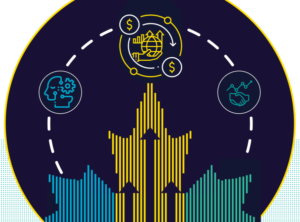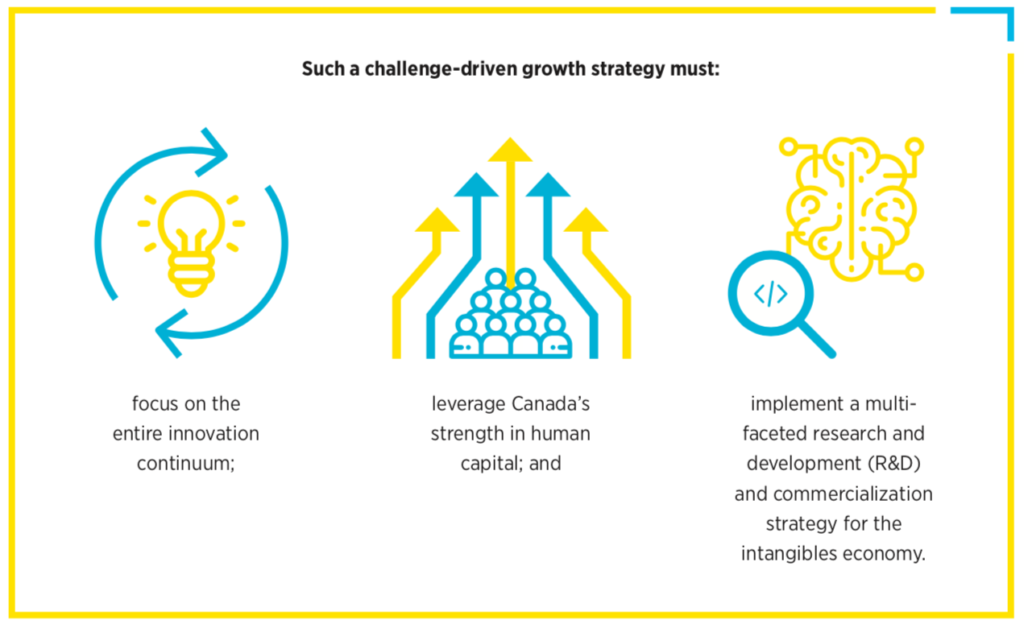
Asselin & Speer: COVID-19 shows us why Canada needs a challenge-driven growth strategy
The first blog of our Policy Speaking seriesThe world is a very different place today than it was just a week ago.
Our daily lives have been altered in ways we would have never conceived. It is hard to imagine we will eventually go back to the old normal. One gets the sense that COVID-19 represents a watershed culturally, economically, and politically.
 We are faced with a dual crisis of gigantic magnitude: a truly global pandemic of unimaginable proportion that will require a human effort only matched in war time and a whole economy that is collapsing under our eyes. Millions of people are losing — and will lose — their jobs. Thousands of companies have no choice but to cease their operations, perhaps for good.
We are faced with a dual crisis of gigantic magnitude: a truly global pandemic of unimaginable proportion that will require a human effort only matched in war time and a whole economy that is collapsing under our eyes. Millions of people are losing — and will lose — their jobs. Thousands of companies have no choice but to cease their operations, perhaps for good.
The full scale of the immediate challenge is staggering: social order has to be maintained; our health system needs supplies, coordination and heroic human effort and devotion; the financial sector needs enough liquidity to function; food supply needs to be guaranteed, and whole sectors of the economy will need to be saved as they are being wiped out. Even more importantly, people who suddenly lose their income and cannot pay their rents need immediate help and income support.
At this particular time, one’s political ideology about the role of government is secondary relative to the necessity to meet the gravity of the moment. In this context, governments become the first and last line of defence, not only because of its disproportionate role in health care and other affected areas, but also because no other part of society has the comprehensive capacity to respond to such a collective threat.
The profound impacts of COVID-19 are obviously not just felt domestically, but on a global scale. The geopolitical ramifications — how nation-states will come to redefine their economic and political interests in a world where structural forces are making them revert to protectionism and self-preservation — will be very consequential. It may indeed be the most lasting impact of this extraordinary crisis. The result could be a withdrawal from global supply chains and a renewed focus on national development.
 The two of us had been thinking about these long-term questions prior to the COVID-19 pandemic. In fact, this week, the Public Policy Forum was set to release New North Star II: A Challenge-Driven Growth Strategy for the Age of Intangibles, a deep dive on how long-held assumptions about the production economy are no longer valid for the new, 21st century geopolitics and the rise of the intangibles economy. As we put it in the upcoming report: the so-called Washington consensus is dead.
The two of us had been thinking about these long-term questions prior to the COVID-19 pandemic. In fact, this week, the Public Policy Forum was set to release New North Star II: A Challenge-Driven Growth Strategy for the Age of Intangibles, a deep dive on how long-held assumptions about the production economy are no longer valid for the new, 21st century geopolitics and the rise of the intangibles economy. As we put it in the upcoming report: the so-called Washington consensus is dead.
The report’s release has been pushed back due to the extraordinary circumstances. But our research and analysis seems even more relevant and timely now.
Policymakers can no longer think about economic growth and public policy in the same way as in the past generation and a half. The rules of the game have changed, and countries are responding by moving swiftly to assert their competitive advantage.
In that context, the idea that Canada can just rely on traditional market forces to remain competitive while everyone else is adopting more active industrial strategies is foolhardy. We are of the view that the confluence of these geopolitical and economic trends — what some have referred to as the return of geo-economics — require a bold policy response: a new, forward-thinking industrial policy that is anchored in the 21st economy and focussed on societal challenge, such as the one we are going through right now with COVID-19.
As it turns out, the Prime Minister announced a few days ago Canada’s Plan to Mobilize Industry to fight COVID-19. The Plan introduces new measures to directly support these businesses to rapidly scale up production or re-tool their manufacturing lines to develop products made in Canada that will help in the fight against COVID-19.
It focuses on domestic capacity building, innovative solutions, and procurement of essential supplies. It tasks the National Research Council of Canada to expedite research and development with small and medium-sized enterprises, and Innovative Solutions Canada to help companies commercialize products more quickly. Finally, it commits to deliver direct support to key Canadian companies that are working on large-scale and later-stage research and development projects aimed, in the immediate term, at producing countermeasures to COVID-19.
This bold industrial approach, we argue in the paper, should not be temporary and only used in times of crisis such as this one. We call it a challenge-driven growth strategy and propose situating such an industrial policy where Canada’s pre-existing industrial strengths intersect with pressing societal challenges.
By aligning policy around challenges such as climate change, smart cities and communities, or aging demographics for example, this type of strategy would serve as a North Star to marshal public and private resources to meet these challenges over the medium and long term.
Canadian governments would then work towards meeting these challenges through a coherent mix of policy interventions and levers that apply across the innovation continuum. For instance, build on our strengths in human capital; design a modern R&D strategy for the age of the intangibles; put intellectual capital front and centre.
A challenge-driven model will spawn new knowledge, new technologies, and new applications. These can not only advance a particular societal objective but also produce spillovers in other parts of the economy, which can ultimately enhance economy-wide productivity.

Such an industrial strategy represents an ambitious transformation of the current economic policy framework. But it is proportionate to the unique circumstances Canada faced before the crisis, and even more so now. The world is changing. Canada needs to be ready for it. Perhaps we’re having an early meeting with the future we were headed toward.





